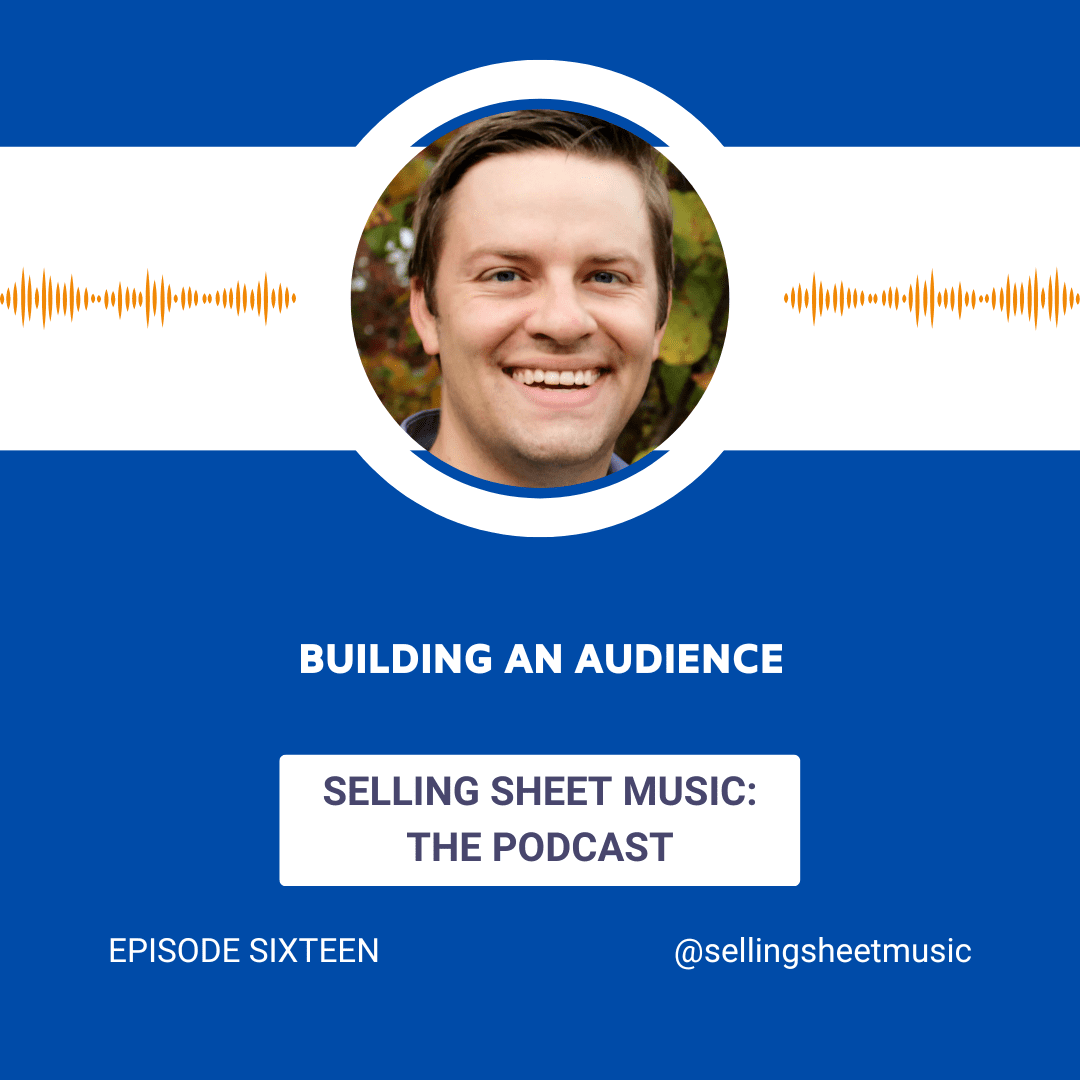Ep. 16: Building an Audience
Episode Description:
I often see composers just spamming their music on social media without any plan, spinning their wheels and getting frustrated. So today we’re going to be talking about how to build an audience and how to communicate with them effectively.
Featured On This Episode:

Garrett Breeze
Garrett Breeze is a Nashville-based composer, arranger, publisher, and the founder of Selling Sheet Music. His credits include film, television, video games, Broadway stars, major classical artists, and many of the top school music programs in the U.S. Visit garrettbreeze.com for more information or to book Garrett for a commission or other event.
Episode Transcript:
*Episode transcripts are automatically generated and have NOT been proofread.*
Alright, so the question everyone is always asking is how do I sell more music? How do I actually get my music in front of people, sheet music or not? That’s always been the thing that musicians trying to make it have struggled with. The good news is that the answer is really simple.
The bad news is that although it’s easy to understand, it’s hard to put into practice. But the way you sell more music is by building a following. It’s very much like an artist trying to build up their fan base.
The main difference, of course, is that if you’re trying to sell sheet music, you’re probably looking for a very specific type of person. That’s what makes it hard. If you’re a singer-songwriter and your goal is just to get people to listen to your music, then the potential audience you’re trying to reach is theoretically everyone in the whole world.
But if your passion is arranging sheet music for trombone quartet, for example, then your potential audience is a lot smaller. You’re basically limited to people who play the trombone, or who have a friend or family member who plays the trombone, and band teachers. But listen, that’s not always a bad thing.
In a lot of ways, it’s easier to stand out in a smaller niche. You don’t have as much competition as, say, people who sing or play the guitar. And we see this trend happening all over the music industry, not just with sheet music.
Because it’s basically impossible to earn a living off of recorded music, more and more artists are trying to lock in that devoted fan base. The people who are going to buy t-shirts and go to shows and spend money on VIP backstage passes and that sort of thing. So when it comes to your audience, or your market, or your customers, or your fans, or your niche, or whatever you want to call it, quality matters a lot more than quantity.
Having 500 followers that click on everything you post is way better than having 3,000 people who only occasionally check in. You’ve got to resist that tendency to chase numbers, especially when it comes to social media. If you’ve got a core group of people who are interested in what you’re doing, you need to keep your attention on them, and not be chasing more followers at the expense of the ones you already have.
The analogy I heard recently was, say your band’s performing at a bar one night, and you get there, and you get all set up, and there’s only 5 people. So you decide to wait for more people to show up before you begin the show. If you do that, you’re ignoring your most dedicated fans.
And besides, people are more likely to want to join a small group that’s having an awesome time, than they are a large group of people sitting around doing nothing. So, first things first, if you want to build a following, you have to give people a reason to follow you. But you also need to be able to clearly articulate what that reason is.
It’s got to be more than just, Hey everyone, look at this new piece I wrote. It’s really hard to make a composition or an arrangement sound cool just by talking about it. There’s no good way to verbally describe what makes a piece of music unique.
But you could talk about who it’s written for, if it’s meant for education or concert performance, if it’s intended for a certain time of year, or maybe there’s a special subject matter or text that the piece tackles. That’s the sort of stuff you should be sharing, and then making it as easy as humanly possible for somebody to get from that post to listening to an audio sample. Of course, there are other reasons someone might want to follow you.
Maybe you write blog posts or explainer videos. Maybe you’re really good at showing the behind the scenes of creating a score. Maybe you’re funny and you post clever memes.
Maybe your posts have nothing to do with music at all. A lot of people follow composers because they like the music, and they want to get to know the person better. So I’m not saying you only have to post one type of content, but you need to be consistent so that people know what they’re going to get.
And that will evolve as you get to know your audience better and what they respond to. And a lot of this is platform-specific. Certain types of posts will perform better on Instagram than they will on Facebook or YouTube or so on.
Which brings me to my next point. Once you’ve figured out why people should follow you, the next step is to figure out how they want to follow you. I’ll give you an example.
A few weeks ago, I sent out one of my weekly email newsletters and not long after that, I got an automated message that so-and-so had unsubscribed from my mailing list. Which is too bad, but it happens. Then a few minutes later, I got a second notification telling me that the same person had just subscribed to my YouTube channel.
And I happen to know who it was, and so that’s probably the reason I noticed it, but it really just illustrated this point so clearly. They weren’t unsubscribing because the content was bad. They weren’t unsubscribing because they were uninterested.
They just preferred to get the information in a different way. So the point is, A, never take it personally, and B, don’t get caught up in stressing about subscriber counts. Look at any of the major publishers, Hal Leonard, Alfred, JW Pepper, Music Notes, and so on, and you’ll see that they have really large followings on some social media sites and really small followings on others.
Now, finally, once you’ve figured out why people should follow you and how they want to follow you, you need to make sure that everything you do to market your music encourages people to join that audience. Make it easy for people to find your channels when they first discover you. Put QR codes and links in your music.
Keep your profiles up to date. Link to your sites and product descriptions and social media posts. Collect emails whenever you can.
Try out different promotions to get new subscribers, and make sure that you’re set up to track all this stuff so you’ll be able to evaluate what’s working and what’s not. Everything you do to promote your music should have the goal of collecting more followers and subscribers. Particularly when it comes to social media, it’s easy to fall into this false sense of accomplishment.
You know, you spend two hours posting about your music on Facebook and you pat yourself on the back because you did your marketing for the day. But if that’s not part of a wider plan, if you’re not looking at the engagement to see what people are responding to, in other words, if it just becomes really one-sided, then you run the risk of coming across as spam, and you end up basically just spinning your wheels and wasting a lot of time. So remember that marketing your music effectively doesn’t mean you have to be constantly posting about it.
Now, of course, it’s important to be tracking your engagement on social media, but that’s not the end-all be-all. You might have somebody that doesn’t like the post, but they click through to your website. That’s arguably a much better result.
On the other hand, you might have tons of people that watch a video you post that are never going to buy sheet music. That doesn’t really help you either. So while I think, yes, you need to have a plan, you need to keep track of your analytics, but at the end of the day, try not to overthink it.
Because if you’re consistently putting out quality content, you’re going to find your people, and you’re going to be just fine.
